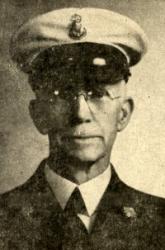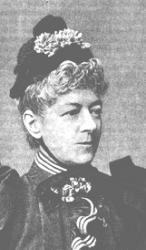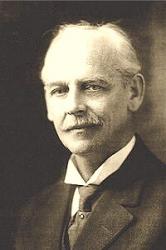Planning worship?
Check out our sister site, ZeteoSearch.org,
for 20+ additional resources related to your search.
- |
User Links
Person Results
‹ Return to hymnal





Export as CSV
Frank C. Huston

1871 - 1959 Person Name: F. C. H. Hymnal Number: 31 Author of "The Christ of the Cross" in The Cokesbury Worship Hymnal Huston, Frank C. (Orange, Indiana, September 12, 1871--October 14, 1959, Jacksonville, Florida). Both parents were musically inclined, and at the age of 12, he was playing cornet in a local concert band. By the age of 17, he was singing regularly in male and mixed voice units, and at 18, he was conducting church music. Education: Moody Bible Institute. Studied with W.M. Hackleman (a cousin), D.B. Towner, W.C. Caffin, and Charles H. Gabriel.
On May 13, 1894, he married Bertha Martin. There were seven children. He spent a brief period as a public school teacher, then became a singing evangelist and traveled for a time with the Charles Reign Scoville Party. He served as Chaplain in the First World War and continued his interest and participation in patriotic organizations. He served a term as Commander-in-Chief of the Sons of Union Veterans of the Civil War and a term as national president of the Federated Patriotic Societies. While in his eighties, he served as chaplain for the Jacksonville Chapter of the Coast Guard.
He was ordained to the ministry of the Christian Church (Disciples of Christ) in 1915. He owned and operated his own publishing company in Indiana for a number of years and was a member of the American Society of Composers, Authors, and Publishers. Frank Huston is credited with more than 400 songs, some patriotic. His two best-known hymns, for which he wrote both words and music, are: "It Pays to Serve Jesus," written in 1909, and "The Christ of the Cross," which was copyrighted in 1924. Among the several hundred others are: "Keep on Believing," "The Word of God Shall Stand," "Lead On, O Christ, Thou Holy One," and "O Holy Day of Pentecost." A book, On Hundred Hymns and Gospel Songs, was published in 1955. For the last 18 years of his life, Huston lived in Florida Christian Home in Jacksonville, a home for the aged maintained by the Christian Church. There, he was active with his music and voluminous correspondence. Funeral services were held in the Edgewood Avenue Christian Church in Jacksonville, Florida, and interment was in Knightstown, Indiana.
--Carlton C. Buck, DNAH Archives
=============================
During World War I, Governor Goodrich of Indiana appointed Huston chaplain of the 150th Field Artillery, Rainbow Division, but through some mistake he was never called to join the regiment before the war ended. His services, however, were in great demand in his home state and city, and he became widely known as the "Singing Chaplain." In World War II, Huston volunteered his services to the Coast Guard Auxiliary. He was made a boatswain’s mate when he was 74 and given duty as a recruiter. He was discharged as an ensign. His works include:
Selected Sacred Songs (Jacksonville, Florida: Frank C. Huston, 1937)
Frank C. Huston
Phoebe Cary

1824 - 1871 Person Name: Phoebe Cary, 1824-1871 Hymnal Number: 160 Author of "One Sweetly Solemn Thought" in The Cokesbury Worship Hymnal Phoebe Cary, (1824-1871) was born and raised in Mount Healthy in Hamilton County, Ohio. Her family came from Lyme, New Hampshire to Ohio when her grandfather was given land in return for his service in the Continental Army. She was the younger sister of Alice Cary (1820-1871). She and Alice submitted poetry to religious periodicals. Phoebe remained in Ohio and continued to write many hymns, including, "One sweetly solemn thought."
Mary Louise VanDyke
===========================================
Cary, Phoebe, sister of Alice Cary, born near Cincinnati, Ohio, Sept. 4, 1824, and died within six months of the death of the same sister at Newport, July 31, 1871. Her works include Poems and Parodies, 1854; and Poems of Faith, Hope and Love, 1868. With Dr. Charles F. Deems she compiled Hymns for all Christians, 1869. Her hymns are:—
1. One sweetly solemn thought. Anticipation of Heaven. This piece was not intended for public use, nor is it a suitable metre for musical treatment, yet it has won universal acceptance and popularity. In some instances this has been attained by change of metre as in the Supplement to the Baptist Psalms & Hymns 1880, No. 1185. Johnson's Encyclopedia is in error in saying it was "written at the age of 17." The Congregational Quarterly for Oct., 1874, says, "it was written, she tells us, in the little back third story bedroom, one Sabbath morning in 1852, on her return from church." This statement shows that it was composed when she was 28, and not 17. The popularity of the hymn in Great Britain arose mainly through its use in the Evangelistic services of Messrs. Moody and Sankey. In the Protestant Episcopal Hymns for Church and Home, Phila., 1860, No. 383, it is given as "A sweetly solemn thought."
The following additional pieces by this author are in the Lyra Sacra Americana, 1868:—
2. Go and sow beside all waters. Seed Sowing.
3. Great waves of plenty rolling up. Gratitude.
4. I had drunk, with lips unsated. Living Waters.
[Rev. F. M. Bird, M.A.]
--John Julian, Dictionary of Hymnology (1907)
Phoebe Cary
Guillaume Franc
1500 - 1570 Person Name: G. Franc Hymnal Number: 2 Composer of "[Praise God, from Whom all blessings flow]" in The Cokesbury Worship Hymnal
Guillaume Franc
Benjamin Francis
1734 - 1799 Hymnal Number: 161 Author of "Praise the Saviour, All Ye Nations" in The Cokesbury Worship Hymnal Francis, Benjamin , M.A., was born in Wales in 1734. He was baptized at the age of 15, and began to preach at 19. He studied at the Bristol Baptist College, and commenced his ministry at Sodbury. In 1757 he removed to Horsley (afterwards called Shortwood), in Gloucestershire. There he remained, through a happy and very successful ministry of 42 years, until his death in 1799. He was the author of many poetical compositions :—
(1) Conflagration, a Poem in Four Parts, (1770); (2) Elegies on the Deaths of the Revs. George Whitefield , Caleb Evans, Robert Day, and Joshua Thomas; (3) The Association, a Poem (1790); (4) a Poetical Address to the Stockbridge Indians (5) two satirical pieces on the Baptismal controversy; The Salopian Zealot; and The Oracle, the former passing through several editions and being reprinted in America.
Francis was the author of five hymns in Rippon's Selections, 1787, all of which are still in common use :—
1. Before Thy throne, eternal King . Meetings of Ministers: or Church Conferences.
2. Glory to the eternal King. Majesty of God. In Snepp's Songs of Grace & Glory for Private, Family and Public Worship, 1872.
3. In tweet [loud] exalted strains . Opening of a Place of Worship . This was given in Rippon, No. 338, in 6 st. of 6 1. with the note:—“Sung on opening the Meeting House at Horsley, Gloucestershire, [his Chapel,] September 18, 1774; and also at the opening of the New Meeting House, at Downend, near Bristol, October 4, 1786."This hymn is abbreviated in the Baptist Hymnal, 1879, to 4 stanzas, and begins with st. iii. which is altered to "Come, King of glory, come." No. 1020 in Spurgeon's Our Own Hymnbook is the same arrangement of stanzas altered by Mr. Spurgeon to "Great King of Zion, now." In several American hymnals it reads: "Great King of glory, come."
4. My gracious Redeemer, I love. The love of Christ to Men. In various collections.
5. Praise the Saviour, all ye nations . Offertory. In Snepp's Songs of Grace & Glory, 1872, No. 739, "With my substance I will honour," is a cento from this hymn.
6. Ye objects of sense and enjoyments of time . Death. A long hymn of 16 st. of 4 l. given in the new and improved edition of Rippon, 1837, No. 553, Pt. ii. with the heading, "The dying Christian bidding adieu to the world." This hymn had previously appeared in the Baptist Register, 1795.
It was as a writer of Welsh hymns, however, that Francis excelled. In 1774 he published his Alleluia, neu Hymnau perthynol i Addoliad Cyhoeddus (Hymns pertaining to Public Worship) To this he contributed 103 hymns. A second volume appeared in 1786, to which he contributed 91 hymns, being a total of 194 in all [D. Sedgwick’s Manuscript]. Of these many are still in common use in Wales, the most popular being:—
1. Clod i'r bendigedig Oen—-a oddefodd.
2. Deffro 'nghalon, deffro 'nghan—-i ddyrchafu.
3. Gwyn fyd y dyn a gred yn Nuw.
4. Arglwydd grasol, clyw fy nghri—-a'm griddfanau.
5. Wele gadarn sylfaen Sion.
[Rev. W. R. Stevenson, M.A.]
-- John Julian, Dictionary of Hymnology (1907)
See also in:
Hymn Writers of the Church
Benjamin Francis
John Bakewell
1721 - 1819 Person Name: John Bakewell,1721-1819 Hymnal Number: 3 Author of "Hail, Thou Once Despised Jesus" in The Cokesbury Worship Hymnal Bakewell, John, born at Brailsford, Derbyshire, 1721. At about the age of eighteen his mind was turned towards religious truths by reading Boston's Fourfold State. From that date he became an ardent evangelist, and in 1744 (the year of the first Methodist Conference) he begun to preach. Removing to London some short time after, he became acquainted with the Wesleys, M. Madan, A. M. Toplady, J. Fletcher, and other earnest evangelical men. After conducting for some years the Greenwich Royal Park Academy, he resigned in favour of his son-in-law, Dr. James Egau, and employed much of his time in preaching at various places for the Wesleyans. He died at Lewisham, near Greenwich, March 18, 1819, aged 98, and was buried in the Wesleyan burying ground connected with the City Road Chapel, London. Mr. Bakewell was the author of a few hymns, the best known being, "Hail Thou once despised Jesus," the abbreviations of the same, "Paschal Lamb, by God appointed," and “Jesus, hail, enthroned in glory." A short memoir of him was published by Mr. Stelfox, Belfast, 1864.
- John Julian, Dictionary of Hymnology (1907)
See also in:
Hymn Writers of the Church
John Bakewell
Sarah Doudney

1841 - 1926 Hymnal Number: 209 Author of "The Christian's "Good-Night"" in The Cokesbury Worship Hymnal Doudney, Sarah, daughter of Mr. George E. Doudney, of Cosham, Hants, was born near Portsmouth, but removed into a remote village in Hampshire at an early age. Her first efforts in literature were made when she was quite young, her poem, "The Lessons of the Water-Mill," a popular song, especially in America, having been written when she was only fifteen. Known mainly to the reading public through her stories, A Woman's Glory, Stepping Stones, and others, and through her contributions to the Sunday Magazine, Good Words, and other serials, her works, including fiction, and sacred and secular poems, have been widely read and appreciated. Her sacred poems are the least numerous of her writings. Some of these, as, "The Master hath come, and He calls us to follow," and "Saviour, now the day is ending," for use at the close of Evening Service, and of more than usual merit, create the desire for more of a like kind. Greater use, however, may be made of what she has written than has been done. By being buried in magazine literature, her hymns are somewhat difficult to trace. Her Psalms of Life was published by Houlston in 1871.
In the Sunday School Union Songs of Gladness, 1871, the following were given;—
1. He hath gone into His garden. The Vineyard of the Lord.
2. In Thy holy garden ground. The Vineyard of the Lord.
3. Land of peace, and love, and brightness. Heaven.
4. Saviour, now the day is ending. Sunday Evening.
5. The Master hath come, and He calls us to follow. Jesus and Mary of Bethany.
6. We praise our Lord to-day. Sunday.
7. We sing a loving Jesus. Praise of Jesus.
Of these, Nos. 1, 2, 3, are in her Psalms of Life, 1871, and all have passed from the Songs of Gladness into other collections.
Her:—
8. Room for the wanderer, room. Christ's Invitation. is in W. B. Stevenson's School Hymnal, 1880.
-- John Julian, Dictionary of Hymnology (1907)
==================
Doudney, Sarah, p. 307, i. Other hymns in common use:—
1. For all Thy care we bless Thee. Morning.
2. Lord of the golden harvest. Harvest.
3. Now the solemn shadows darken. Evening.
Nos. 1, 2, are from Miss Doudney's Psalms of Life, 1871, and No. 3 is in Mrs. Brock's Children's Hymn Book, 1881.
--John Julian, Dictionary of Hymnology, Appendix, Part II (1907)
Sarah Doudney
Rebecca J. Weston
Hymnal Number: 281 Author of "Father, We Thank Thee" in The Cokesbury Worship Hymnal
Rebecca J. Weston
Karl P. Harrington

1861 - 1953 Hymnal Number: 216 Composer of "[There's a song in the air! There's a star in the sky]" in The Cokesbury Worship Hymnal Born: June 13, 1861, Somersworth, New Hampshire.
Died: November 14, 1953, Berkeley, California.
Buried: Middletown, Connecticut.
Son of Calvin S. and Eliza Chase Harrington, Karl earned his AB degree in 1882, and his AM in 1885, from Wesleyan University in Middletown, Connecticut. He studied at the University of Berlin (1887-89) and Yale University (1890-91). He taught high school in Westfield, Massachusetts (1882-85); Latin at Wesleyan Academy in Wilbraham, Massachusetts (1885-87); was a Latin tutor at Wesleyan University (1889-91); Latin professor at the University of North Carolina, Chapel Hill (1891-99); University of Maine (1899-1905); and Wesleyan University (1905). While at the University of North Carolina, he directed the Glee Club. His works include:
The Roman Elegiac Poets, circa 1914
Richard Alsop, "a Hartford Wit"
Walks and Climbs in the White Mountains, 1926
--www.hymntime.com/tch/
Karl P. Harrington
Charles T. Brooks

1813 - 1883 Person Name: C. T. Brooks Hymnal Number: 227 Author of "God Bless Our Native Land" in The Cokesbury Worship Hymnal Brooks, Charles Timothy. An American Unitarian Minister, born at Salem, Mass., June 20, 1813, and graduated at Harvard, 1832, and the Divinity School, Cambridge, U.S., 1835. In that year he began his ministry at Nahant, subsequently preaching at Bangor and Augusta (Maine), Windsor (Vermont). In 1837 he became pastor of Newport, Rhode Island, and retained the same charge until 1871, when he resigned through ill-health. [Rev. F. M. Bird, M.A.]
-- John Julian, Dictionary of Hymnology (1907)
================
Brooks, C. T. (p. 184, i,). He died at Newport, Rhode Island, June 14, 1883.
--John Julian, Dictionary of Hymnology, Appendix, Part II (1907)
Charles T. Brooks
Eleanor Allen Schroll
1878 - 1966 Hymnal Number: 107 Author of "The Beautiful Garden of Prayer" in The Cokesbury Worship Hymnal Born: 1878, Newport, Kentucky.
Died: January 8, 1966, Daytona Beach, Florida.
Buried: Southgate, Kentucky.
Lyrics--
Beautiful Garden of Prayer, The
He Lives
--www.hymntime.com/bio
Eleanor Allen Schroll


 My Starred Hymns
My Starred Hymns


